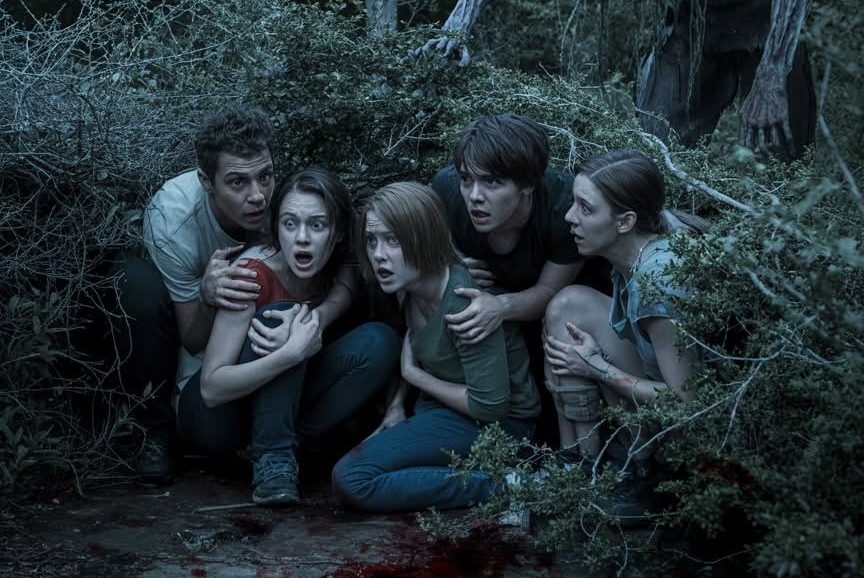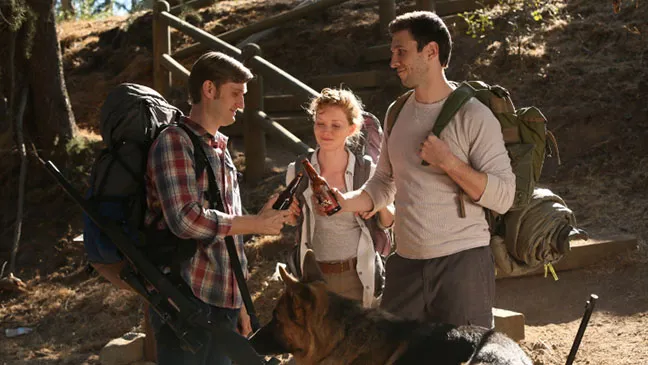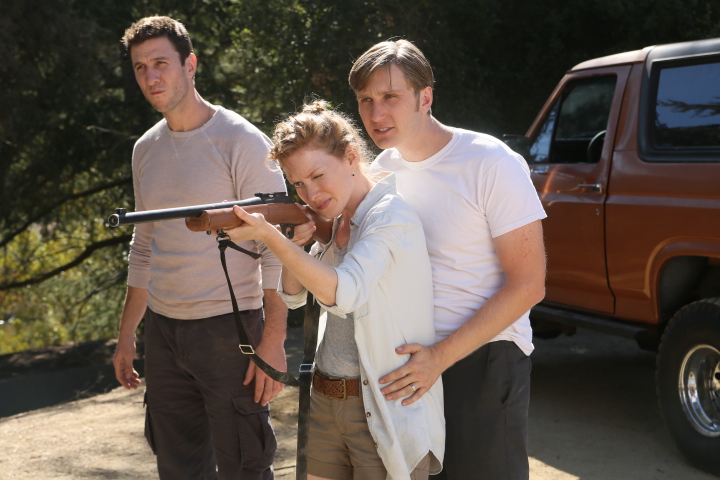Preservation (2014) – The Hunt for Survival Within

Preservation (2014) is a stripped-down, unnerving survival thriller that dissects both fear and instinct with surgical precision. Directed by Christopher Denham, the film trades grand spectacle for suffocating intimacy — an examination of what happens when civilization collapses inside the human mind. It’s a story that begins as a weekend getaway and spirals into a brutal meditation on violence, survival, and the fragility of moral restraint.
The premise is deceptively simple. Wit (Wrenn Schmidt) joins her husband Mike (Aaron Staton) and his ex-Marine brother Sean (Pablo Schreiber) on a hunting trip in a remote wildlife preserve. The setting is serene — endless forests, quiet lakes, the illusion of peace. But beneath that stillness lurks tension: between the brothers, between Wit and her crumbling marriage, and between humanity and the wild itself. What starts as an ordinary outing becomes a nightmare when the trio wakes up to find their gear stolen, their faces marked with black Xs — and someone, or something, watching them.
Denham wastes no time dismantling the façade of safety. The film’s first act lulls the viewer with familiarity — banter, small conflicts, the hierarchy of a typical outdoor trip — before peeling it away to reveal the raw nerves underneath. Once isolation sets in, the tone shifts sharply. Dialogue becomes minimal. The camera clings to the characters’ faces as paranoia takes hold, turning the forest into a living organism — beautiful, silent, and utterly indifferent.
Wrenn Schmidt anchors the film with a performance that is both vulnerable and ferocious. Her Wit begins as a picture of modern complacency — intelligent, composed, disconnected from her primal self. But when terror arrives, she transforms. Her survival is not heroic but animalistic, born of necessity rather than choice. Schmidt’s portrayal is unsettlingly believable; by the end, the line between victim and predator blurs completely.
Pablo Schreiber delivers a raw, magnetic performance as Sean, the hardened soldier whose notions of control and masculinity unravel as the situation worsens. His discipline becomes arrogance, his training a curse. Aaron Staton’s Mike, soft-spoken and self-absorbed, provides the emotional fault line — his inability to adapt accelerates the collapse. Together, the trio becomes a microcosm of modern fragility — proof that strength without empathy, and intellect without instinct, are useless when civilization falls away.
Cinematographer Nicola Marsh transforms the wilderness into a silent antagonist. The natural lighting, often dim and washed in muted greens and grays, conveys a realism that’s deeply unnerving. The camera rarely pulls back — instead, it traps viewers in tight, claustrophobic frames, making every rustle, breath, and branch crack feel intimate and immediate. The forest is never just backdrop; it’s an arena, ancient and impartial.
The sound design amplifies tension with masterful restraint. The absence of music for much of the runtime allows the natural sounds — wind, insects, distant movement — to gnaw at the nerves. When the score by Alexis Marsh and Samuel Jones does appear, it’s low, pulsing, and unnervingly human — a heartbeat that rises and falls with panic.
What elevates Preservation beyond a standard survival thriller is its refusal to glamorize violence. Denham strips the genre to its core, exploring what happens when moral constructs collapse under pressure. The film doesn’t ask whether we can survive — it asks who we become when we do. Wit’s transformation, both horrifying and liberating, becomes the film’s moral pivot. Her actions in the final act force the audience to question whether survival itself is victory, or just another form of loss.

The antagonists — teenage hunters armed with modern technology — add a chilling layer of commentary. Their cruelty is casual, almost playful, mirroring a generation desensitized to suffering. They hunt for sport, for thrill, for the illusion of power — and in facing them, Wit becomes a reflection of their own violence. It’s a brutal cycle, and Denham refuses to offer catharsis.
The final act is a crescendo of tension and despair. Blood mixes with mud, screams vanish into silence, and the forest reclaims everything. The last image — Wit standing alone, her face expressionless, her hands trembling with both triumph and horror — lingers long after the credits roll. She survives, but at the cost of innocence, morality, and maybe her soul.
In conclusion, Preservation (2014) is a stark, intelligent thriller that cuts deeper than its premise suggests. It’s not just about survival in the wild — it’s about the wilderness within us all. With fearless performances, minimalist direction, and unnerving realism, it stands as a modern reminder that the line between predator and prey is drawn not by strength, but by circumstance.
The forest doesn’t care who’s right.
Only who’s left. 🌲🔪
Related movies :
Related movies :
Related movies :
Related movies :
Related movies :
Related movies :











